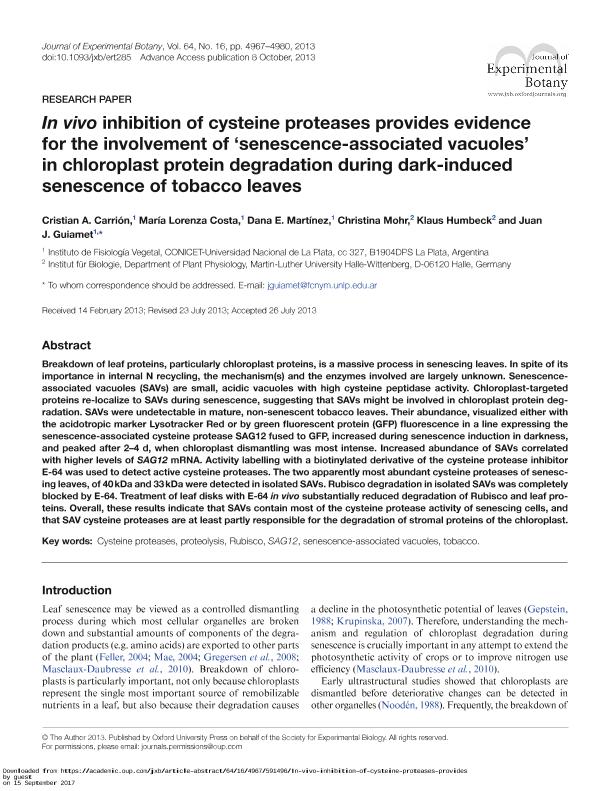Artículo
In vivo inhibition of cysteine proteases provides evidence for the involvement of ‘senescence-associated vacuoles’ in chloroplast protein degradation during dark-induced senescence of tobacco leaves
Carrión, Cristian Antonio ; Costa, M.lorenza
; Costa, M.lorenza ; Martinez, Dana Ethel
; Martinez, Dana Ethel ; Mohr, Christina; Humbeck, Klaus; Guiamet, Juan José
; Mohr, Christina; Humbeck, Klaus; Guiamet, Juan José
 ; Costa, M.lorenza
; Costa, M.lorenza ; Martinez, Dana Ethel
; Martinez, Dana Ethel ; Mohr, Christina; Humbeck, Klaus; Guiamet, Juan José
; Mohr, Christina; Humbeck, Klaus; Guiamet, Juan José
Fecha de publicación:
07/2013
Editorial:
Oxford University Press
Revista:
Journal of Experimental Botany
ISSN:
0022-0957
Idioma:
Inglés
Tipo de recurso:
Artículo publicado
Resumen
Breakdown of leaf proteins, particularly chloroplast proteins, is a massive process in senescing leaves. In spite of its importance in internal N recycling, the mechanism(s) and the enzymes involved are largely unknown. Senescence-associated vacuoles (SAVs) are small, acidic vacuoles with high cysteine peptidase activity. Chloroplast-targeted proteins re-localize to SAVs during senescence, suggesting that SAVs might be involved in chloroplast protein degradation. SAVs were undetectable in mature, non-senescent tobacco leaves. Their abundance, visualized either with the acidotropic marker Lysotracker Red or by green fluorescent protein (GFP) fluorescence in a line expressing the senescence-associated cysteine protease SAG12 fused to GFP, increased during senescence induction in darkness, and peaked after 2–4 d, when chloroplast dismantling was most intense. Increased abundance of SAVs correlated with higher levels of SAG12 mRNA. Activity labelling with a biotinylated derivative of the cysteine protease inhibitor E-64 was used to detect active cysteine proteases. The two apparently most abundant cysteine proteases of senescing leaves, of 40kDa and 33kDa were detected in isolated SAVs. Rubisco degradation in isolated SAVs was completely blocked by E-64. Treatment of leaf disks with E-64 in vivo substantially reduced degradation of Rubisco and leaf proteins. Overall, these results indicate that SAVs contain most of the cysteine protease activity of senescing cells, and that SAV cysteine proteases are at least partly responsible for the degradation of stromal proteins of the chloroplast.
Archivos asociados
Licencia
Identificadores
Colecciones
Articulos(INFIVE)
Articulos de INST.DE FISIOLOGIA VEGETAL
Articulos de INST.DE FISIOLOGIA VEGETAL
Citación
Carrión, Cristian Antonio; Costa, M.lorenza; Martinez, Dana Ethel; Mohr, Christina; Humbeck, Klaus; et al.; In vivo inhibition of cysteine proteases provides evidence for the involvement of ‘senescence-associated vacuoles’ in chloroplast protein degradation during dark-induced senescence of tobacco leaves; Oxford University Press; Journal of Experimental Botany; 64; 16; 7-2013; 4967-4980
Compartir
Altmétricas



